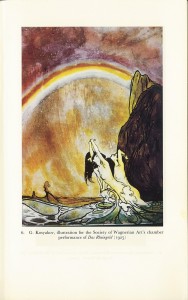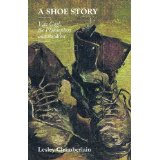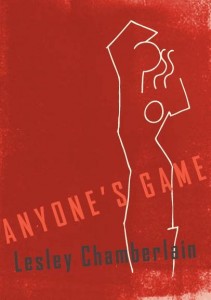2022
Rilke: The Last Inward Man
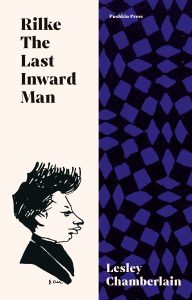 Rilke’s been on my mind since I first learnt German. It was Goethe, Hölderlin and Rilke taught me German was a beautiful language: musical, subtle and poignant. It’s all the little particles of meaning that matter, and a poet like Rilke (1875-1926) knows just how to juxtapose and vary those infinte shades of expression. Of course translating him into English is a task. But one thing I’ve tried to do in my latest book — brilliantly published by Pushkin Press — is to take away some of the unnecessary layers of complication that have accrued over the years. His linguistic picture-work is richly textured and imaginatively stunning, but also simple. Here he is, for instance, despairing at moments when inspiration — and the courage to lead his life at all — fail him:
Rilke’s been on my mind since I first learnt German. It was Goethe, Hölderlin and Rilke taught me German was a beautiful language: musical, subtle and poignant. It’s all the little particles of meaning that matter, and a poet like Rilke (1875-1926) knows just how to juxtapose and vary those infinte shades of expression. Of course translating him into English is a task. But one thing I’ve tried to do in my latest book — brilliantly published by Pushkin Press — is to take away some of the unnecessary layers of complication that have accrued over the years. His linguistic picture-work is richly textured and imaginatively stunning, but also simple. Here he is, for instance, despairing at moments when inspiration — and the courage to lead his life at all — fail him:
You take yourself from me, friendly hour.
Your wings flap and it hurts.
I’m alone: what’s the point of my mouth?
And my night? And my day?
I have no love, no house.
What do I stand on and where do I dwell?
All things to which I give myself
grow rich; I grow unwell.
My book is not a biography so much as a series of essays, or talks, starting with ‘How to Read Rilke Today’ and asking finally in what sense he is ‘The Last Inward Man’, lacking almost all desire to make his inner life politically and socially relevant. The two chapters on his years in Paris were a joy to write, while the section headed ‘Shall We Still Try to Believe in God’ helped me place Rilke as a modernist and not. (‘What will you do, God, when I die?’) He’ll always have a top place in the lineup of writers who have mattered to me over a lifetime, and, for the record, I also write about Rilke in connection with Heidegger in my book A Shoe Story (2014).
Nietzsche in Turin The End of the Future
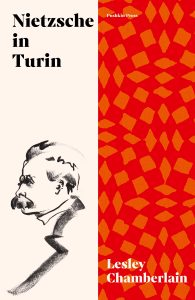 The Last Inward Man is a companion volume to the Nietzsche in Turin I wrote a quarter of a century ago and first published in 1996. It’s great to have the Nietzsche reissued by Pushkin Press, so it can sit there on the shelf in the same design, different livery, as the Rilke.
The Last Inward Man is a companion volume to the Nietzsche in Turin I wrote a quarter of a century ago and first published in 1996. It’s great to have the Nietzsche reissued by Pushkin Press, so it can sit there on the shelf in the same design, different livery, as the Rilke.
There’s a marvellous final moment in Rilke’s poem ‘Archaic Torso of Apollo’ when he writes: you must change your life. The idea is that if the experience of a work of art is sufficiently intense that’s just what you’ll do. It strikes me as a pure Nietzschean sentiment and it reminds us just how powerful the art experience was to both writers. Art was a huge presence. It was also the shape of their own life, something they wrestled with, just as artists wrestle with their materials to produce order and coherence and beauty. There was this crossover between Nietzsche (1844-1900) and Rilke (1875-1926). It was the affinity between the philosopher writing in German who was also a poet, and the poet who for generations now has appealed to readers as a kind of philosopher. Some of Nietzsche’s last poems have an astonishing Rilkean ring. Some of Rilke’s sentiments, including that feeling of the loss of God, are close to what Nietzsche felt about the death of God, and how we need to invent ourselves anew. Both are masters of the German language. Just to recap on the gist of the Nietzsche book meanwhile: Nietzsche spent the last sane year of his life, 1888, as he struggled not to succumb to the symptoms of tertiary syphilis, in the stately Piedmont capital of Turin. There, and on his annual excursion to Sils Maria in Switzerland he wrote an astonishing six works, including his essay on Wagner and his autobiographical Ecce Homo. I write in the first line of this book that it was an effort to befriend Nietzsche, and so it was, for several reasons. One was that Nietzsche had a terrible reputation in the English-speaking countries after the 1939-1945 war. His ‘Superman’ — a misleading translation of the word Übermensch — seemed to make him a precursor of Nazi suprematism. That taint lasted a long time. While I was writing the book around 1993 I was introduced to a professor of English who turned his back on me when he learned of my work in progress. Another reason for the gesture of friendship on my part was simply that he was a writer who mattered to me — a spirit to whom I felt close.
2021
Rainer Maria Rilke Duino Elegies, translated by Vita Sackville-West and Edward Sackville-West
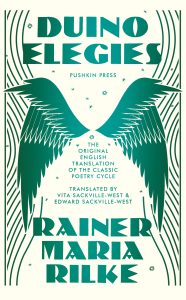 I had only a small part in this volume but it completes the hat-trick of work of mine published in Spring 2022, so I have to mention it here. While I was working on The Last Inward Man I came across this translation of The Duino Elegies, which Rilke published in 1922. Parts of that great cycle of poems had been put into English, and quite a lot of Rilke’s other poetry was already available. But here was the first complete English version, originally published in 1931 in a deluxe edition by Leonard and Virginia Woolf’s Hogarth Press. Pushkin Press have unearthed it after so long. Readers used to a very modern-sounding Rilke rendered in free verse will meet something new in this blank-verse translation. The tone is loftier, the music more insistent. Edward Sackville-West, a novelist and composer who knew German well, and his cousin Vita, a prizewinning English poet in her day, moved the English reading of Rilke into a new gear with their landmark work — all of which I discuss in a short and I hope helpful introduction to this fringe-of-Bloomsbury enterprise.
I had only a small part in this volume but it completes the hat-trick of work of mine published in Spring 2022, so I have to mention it here. While I was working on The Last Inward Man I came across this translation of The Duino Elegies, which Rilke published in 1922. Parts of that great cycle of poems had been put into English, and quite a lot of Rilke’s other poetry was already available. But here was the first complete English version, originally published in 1931 in a deluxe edition by Leonard and Virginia Woolf’s Hogarth Press. Pushkin Press have unearthed it after so long. Readers used to a very modern-sounding Rilke rendered in free verse will meet something new in this blank-verse translation. The tone is loftier, the music more insistent. Edward Sackville-West, a novelist and composer who knew German well, and his cousin Vita, a prizewinning English poet in her day, moved the English reading of Rilke into a new gear with their landmark work — all of which I discuss in a short and I hope helpful introduction to this fringe-of-Bloomsbury enterprise.
Street Life and Morals German Philosophy in Hitler’s Lifetime
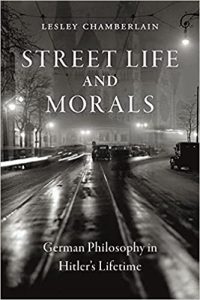 I somehow shared the shock of German writers and thinkers of a hundred years ago at what happened to Germany in the 1930s. Perhaps it was because in my early life I studied them as if Nazism never happened. The study of literature certainly wasn’t as politically and historically informed in those days. But perhaps it was also the case that I was drawn to something like art for art’s sake, and the equivalent in philosophy: philosophy for truth’s sake — though I have never heard anyone use the expression and I surely can’t get away with that use of the word ‘truth’ these days as if it were spoken by Plato.
I somehow shared the shock of German writers and thinkers of a hundred years ago at what happened to Germany in the 1930s. Perhaps it was because in my early life I studied them as if Nazism never happened. The study of literature certainly wasn’t as politically and historically informed in those days. But perhaps it was also the case that I was drawn to something like art for art’s sake, and the equivalent in philosophy: philosophy for truth’s sake — though I have never heard anyone use the expression and I surely can’t get away with that use of the word ‘truth’ these days as if it were spoken by Plato.
In any case in my book Street Life and Morals (Reaktion/Chicago University Press 2021) — whose publication has been masked by Covid – I retrace the birth and fortunes of certain themes in German philosophy as they arise in the late nineteenth century and what I want to know about is how the high-minded world of German thought is suddenly obliged to engage with astonishing social and political change. It’s a shock, almost a cultural revolution, and from the Kantian modernist Georg Simmel to the supreme literary modernist Walter Benjamin, philosophy struggles to come to terms with cities; that is with vast polities of strangers; and a street life full of intoxicating sensations; only in Benjamin does it strangely rejoice, and reset. What arises overall is a crisis for a country whose philosophical patron saint, in all but name, is the sober and inward-looking Immanuel Kant. Not inward-looking like Rilke perhaps, but inspired by religious tradition (Catholic in Rilke’s case, Lutheran Pietist in Kant’s).
The first half of my book is a survey of that street life as philosopher-novelist- journalist-critics like Siegfried Kracauer and the Mann brothers Thomas and Heinrich react to it. At the same time I show how the neo-Kantianism taught in the universities went through its own upheavals, with a remarkable switch from philosophy aimed at the perfect life, Platonically conceived, to the tribulations of ‘the bare life’, das bloβe Leben, the actual nerve-wracked, threatened physical life that most people lead. German philosophy makes this extraordinary switch from Idealism to materialism, with Marxism as an outlier in the pursuit of new human truths. Street Life and Morals asks where a more realistic socially-minded German philosophy can take its ethical standards, if it can no longer turn to Kantian inwardness (or the examination of private conscience).
The second half of my book looks in greater detail at how particular thinkers — Heidegger, Benjamin, Adorno, Horkheimer and the young Hannah Arendt (up to 1945) — work through their Kantian beginnings and take up new positions. I call them ‘rubble philosophers’ after the Trümmerfrauen who patiently cleaned the bricks to rebuild German cities after the second world war. I see these philosophers as dealing with a radical break in the history of humanist philosophy which occurred as much as thirty years before. Not everyone will be comfortable seeing Heidegger’s name on that list, but the context makes absolutely clear why his philosophy of Being-Here (Dasein) was a response to the vanishing plausibility of Idealism, and how Heidegger out-argued its last vestiges. It’s fascinating too to trace what links such diverse and conflicted figures as Heidegger, Adorno and Benjamin, despite the antipathy of the last two for Heidegger, and despite Arendt’s dislike of Adorno, love of Heidegger and protective fondness for Benjamin. In fact I mention Hitler very little. On the other hand the period in question — 1889 -1945, in case you had forgotten the lifespan of Hitler – shows just how the problems besetting the philosophers were the same problems besetting society and which eventually made the rise of Hitler possible. Those problems were a sudden disbelief in reason, a sense of how difficult it was for individuals — now commonly thrown together in urban crowds — to communicate one with another, and a mixture of cultural panic and excitement over the arrival of new technology. It is I think an extraordinary chapter in the history of philosophy and one thing I hope it does, in passing, is show that German philosophers were hardly supine in ‘allowing’ the rise of Hitler. They were engaging in direct social and political problems — but in their own terms.
2019
Ministry of Darkness How Sergei Uvarov created conserative modern Russia
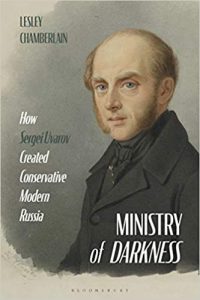 Readers of my work will know that I write about both Germany and Russia. These are the cultures I’ve studied most deeply and the languages I know best. I was a reader of Russian literature and philosophy before I ever gave a thought to Russian history and politics — but then who can read the great Russian novels and not feel caught up in the political destiny of mankind? German literature has traditionally been inward and linguistically complex, just like Rilke (though he was Austrian-born). By contrast, as I always felt it, Russian literature was social, which inevitably also means satirical. It remains full of urgent, often philosophical messages. ‘Formalism’ — what we might call art for art’s sake, though it was so much more — was officially outlawed in Soviet times. Well it’s a long story, with plenty of exceptions (the poetry of Mandelshtam, anything by Pasternak, and the essence of Pushkin, for instance). But it was the case that Russian literature, together with the country’s history and philosophy, made me sit up and take notice of the politics; and the man who crystallized those politics for me — way back in 1978, when I first encountered him — was Count Sergei Semyonovich Uvarov.
Readers of my work will know that I write about both Germany and Russia. These are the cultures I’ve studied most deeply and the languages I know best. I was a reader of Russian literature and philosophy before I ever gave a thought to Russian history and politics — but then who can read the great Russian novels and not feel caught up in the political destiny of mankind? German literature has traditionally been inward and linguistically complex, just like Rilke (though he was Austrian-born). By contrast, as I always felt it, Russian literature was social, which inevitably also means satirical. It remains full of urgent, often philosophical messages. ‘Formalism’ — what we might call art for art’s sake, though it was so much more — was officially outlawed in Soviet times. Well it’s a long story, with plenty of exceptions (the poetry of Mandelshtam, anything by Pasternak, and the essence of Pushkin, for instance). But it was the case that Russian literature, together with the country’s history and philosophy, made me sit up and take notice of the politics; and the man who crystallized those politics for me — way back in 1978, when I first encountered him — was Count Sergei Semyonovich Uvarov.
In fact it may have been a few years earlier, when I read a chapter by the emigre philosopher Alexander Koyré, in French, about Uvarov as the architect of Russian national policy in the 1830s, that I thought he was a man I should try to understand. He was the country’s Minister of Public Enlightenment, which was to say Education, from 1833-1848, but his brilliance carried his influence on tsar Nicholas I far beyond his official remit. Uvarov came up with the idea that the Russian ship of state needed to adhere to three tenets: Orthodoxy (or, let’s say, a common religion), Autocracy (which speaks for itself, still today) and Nationality, that is to say, Russian-ness. I usually translate that third term as Official Nationality, because though it was related to the Romantic idea of self-determination which had captured many hearts in nations across Europe at the time — think of Poland, Bohemia, Hungary — it was only ever tolerated in Russia as a set of feelings sanctioned and exploited by the existing power of the state. Russian narodnost’ was an emotional force and a source of potential social cohesion, but it was never going to be allowed as a revolutionary sentiment in tsarist times. But what a genius Uvarov was to distill this formula for the future of modern Russia! And what it explains to us about Russia still today! Here, in Orthodoxy, Autocracy and Nationality, was official conservative Russia’s answer to the quite different aims of the French Revolution: liberty, equality, fraternity.
I first worked on my biography of Uvarov when I lived in Moscow in 1978-79, and he helped me understand Soviet Russia like no other commentator. The terminology had changed, but the three great forces remained. They were now Marxist-Leninism, The Party and international Communist fraternity.
My book is not a wholesale condemnation of Uvarov, however, because I was fascinated by his personal plight, as a top Russian official. Whenever the Russian state presents an evil face to the world we’re bound to think of all those individual Russians who think quite differently, but dare not say. Uvarov’s fate was to be, as one historian put it long ago, the best-educated man of his generation and in a way a thoroughgoing European. Born in 1784 and partly educated in Germany, he was a classicist, an archeologist and a distinguished writer in French, with an entry in the Larousse Encyclopedia. His aim was slowly to introduce educational and hence social reforms to autocratic Russia, and in this he was quietly successful. Cynthia Whittaker in her book Sergei Uvarov The Origins of Russian Education spells out his remarkable achievement. But at what personal cost, I wanted to ask. Uvarov, often cast as the great reactionary in nineteenth-century Russian history, was in 1848, the year of renewed revolutions in Europe, dismissed from his post for not being reactionary enough. So Ministry of Darkness, published by Bloomsbury in 2019, is the story of one intelligent man’s agony at trying to serve conservative Russia because he found early in his life that anything overtly more liberal was doomed to failure. And even then he failed; or both succeeded and failed.
2017
Arc of Utopia The Beautiful Story of the Russian Revolution
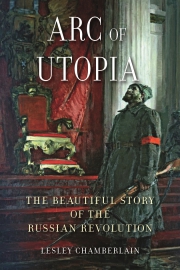 Russia sometimes seems all political machination and imperial and neo-imperial aggression, but then it has that quite different side to its culture: of great art and imagination, and fabulous political dreams. I’m glad I tried to do justice to that imaginative Russia before I took to spelling out so painfully the triumphant, repressive political conservatism of Uvarov. I keep both those Russias in my head, knowing I can’t reconcile them.
Russia sometimes seems all political machination and imperial and neo-imperial aggression, but then it has that quite different side to its culture: of great art and imagination, and fabulous political dreams. I’m glad I tried to do justice to that imaginative Russia before I took to spelling out so painfully the triumphant, repressive political conservatism of Uvarov. I keep both those Russias in my head, knowing I can’t reconcile them.
The book I devoted to Russian dreams was Arc of Utopia The Beautiful Story of the Russian Revolution and it was published in October 2017 by Reaktion. It had a fabulous cover, as shown above. But this gorgeous image was also in the running, It was an illustration for the Society of Wagnerian Art’s chamber performance of Das Rheingold in Leningrad in 1925 (in those twelve years after the October Revolution when the future of Soviet Russian culture was still in the balance, all modernist and Western influences not yet shut down). G. Kosyakov was the illustrator:
The Arc of Utopia was how I conceived the story of Russia that grew out of German Romantic philosophy. It created the idea of Russia as an ideal work-in-the-making, and as Russian artists and intellectuals transformed what they found in Goethe and Schiller, Kant and Hegel and Schelling, so they constructed a political blueprint on aesthetic lines. The ideal was one of togetherness and harmony: the beautiful life as a revolutionary politics,
I had wanted to write this passionate chapter in the history of ideas for years. (All my projects seem to have deep roots.) Arc of Utopia dated back to when I too — like those early nineteenth-century Russians — had immersed myself in German Idealism, in the hope of working out what was the good life to be lived. It was German Idealism — ultimately the philosophy of Hegel – that Richard Wagner set to music, some people say. Hence the pertinence of the image above.
I found myself in Soviet Russia even before I had finished with the Hegelian and Schellingist dreams of the Russian 1830s. Now it seemed I was confronted everywhere with a dream gone wrong — even while a Soviet newspaper like Pravda could still address the people as if it were speaking the Enlightenment message of Immanuel Kant.
The Soviet Russia of the 1970s, presided over by Party General Secretary Leonid Brezhnev, was a disaster with a secret poignant history. I wanted to tell the story of a dream of social transformation, inspired by philosophy but now driven into the ground. Of course it was a failure, but that’s not the only thing to understand about how Russia entered the modern world, especially, if, like me, you feel that Russia’s greatest asset is its creativity: its art, not its politics. Back in 1790 in Kant’s East Prussia, via the German Romantics in the 1810s and 1820s, and then from the 1830s amid their disciples in Moscow and St Petersburg, a certain aesthetic utopianism set the story in train. Kant talked about what he called our faculty of judgement. What made (and makes) us supremely human is to see the world not as it is but as it might be, as a beautiful and harmonious whole. I argue in Arc of Utopia that this vision carried forward by German Romanticism helped inspire the art, drama and politics that surrounded the anti-tsarist revolutions of 1905 and 1917. You can find a longer article about Arc of Utopia on my blog at https://lesleychamberlain.wordpress.com/2017/09/28/the-arc-of-utopia-in-the-anniversary-year-of-russia-1917/. www.reaktionbooks.co.uk on its Arc of Utopia page also features extracts from the reviews.
2014
I walked a few years ago in the footsteps of the lovable Dutch painter-philosopher Vincent Van Gogh and the awkward German philosopher and sometime Nazi Martin Heidegger to tell a story of twentieth-century art from an unfamiliar perspective. Now the book of that journey is finally complete. From Heidegger’s 1936 essay on art’s origins to a debate in 1977 when Jacques Derrida showed art ‘going to work’ in Heideggerian fashion, and not just hanging on the wall, I stumbled on a mass of material, suggesting how turmoil over the divine origins of the universe had radical implications for art, artists and our daily existence. Concurrently with Darwin and his influence, I lingered over the impact of the growth of consumer society and mass media, as they intensified the need among the philosophers for a redefinition of art. ‘A Shoe Story’ sounds, I hope, like a riff on ‘a true story’ and that’s the spirit in which this book is written: as the story of how a painter born in 1853 came to create a certain work and how philosophers over the next 150 years came to fight over it in a bid for new meaning. To tell the Shoe Story I also made a physical journey, on foot, to some of van Gogh’s and Heidegger’s places, where, respectively, their art and philosophy began. I found nature, strife and a Europe of the mind.
2012
Anyone’s Game
Sophie Asmus, 19, runs away from Russia’s Civil War (1919-21) and begins a new, married life in Scotland. The year is 1919 but it could be 1989, or 2009, for this a novel taking place in a global space and age of upheaval. It tells the story of a woman’s attempt to reinvent her life, over and over, helped and hindered by personal ambition, history and fortune. It features Sophie’s life among the artists in post-revolutionary Moscow, her time down-and-out in London and Scotland, and an extraordinary interlude when she befriends rising novelist Percy Nair in Cambridge. Sophie’s unorthodox love affairs from Moscow to Paris carry the action into the 1930s, when history once again wrenches her life out of her control.
From the Reviews:
‘The difficult life of Sophie Asmus is thrilling, not least because her own liberation comes at a cost. She is a remarkable and haunting creation.’ Jennie Erdal The Independent. Read the whole review here.
Sophie’s pursuit of freedom, self-knowledge and a “home” in a “rational world” takes her to Constantinople, Scotland, Moscow, London, Cambridge and Paris. This unpredictable journey unfolds amid political unrest and economic distress in the decade after the First World War. ..One of the many strengths of this absorbing novel lies in the unsentimental characterization of Sophie, which Chamberlain achieves through a clever framing device. Anyone’s Game is told from the vantage point of the 1990s, by an anonymous narrator who has met Sophie’s son, Leksy, now an elderly widower. Susan Civale The Times Literary Supplement. Read the whole review here.
The plot and language of this tale are rich, often poetic, often comic; we cut from scene to scene and from one point of view to others in the best cinematic tradition; mysterious brief snatches of conversation interrupt and comment on the story; the reader is teased and tested throughout, but never bored, always rewarded by wit, pathos, vividness, insight, the ironies of history and the humour and courage of those who are swept along by it. R.Owen on Amazon.co.uk. Read the whole review here.
Anyone’s Game ISBN 978-1-905128-19-8 is published by Harbour Books.
2006
 The Philosophy Steamer Lenin and the Exile of the Intelligentsia
The Philosophy Steamer Lenin and the Exile of the Intelligentsia
In September 1922 Russia expelled around seventy philosophers, academics, journalists and others considered unlikely ever to come round to a Marxist-Leninist point of view. Lenin, who founded the Soviet Union three months later, initiated the campaign and chose many of the names on the list himself. This book recounts, for the first time in English, the story of these men who were deported for their anti-Communist attitudes and what happened to them when they made new lives in Berlin, Prague and Paris. This historic event, which, including family members, forcibly deprived more than 200 Russians of their homeland, takes its name from the religious philosophers, who were Lenin’s most prominent victims. The Philosophy Steamer, which contains rare photographs from police and family archives, concludes by asking what this event meant in the history of ideas. Why should ‘reason’, the cause Lenin espoused, have wanted to banish religion, just as the twentieth century got underway?
’The persecution of free-spirited intellectuals and artists in the Soviet era has become, in many respects, a familar tale. Numberless novels and memoirs have described, in nightmarish detail, the varied forms of coercion and punishment it adopted — whether in Josef Stalin’s prison camps or Leonid Brezhnev’s psychiatric hospitals, through public shaming or private harassment. Yet there is an episode in this chronicle which is less widely known, even though it occurred at the very beginning. With her new book, ’The Philosophy Steamer’, Lesley Chamberlain makes an irrefutable case for its significance in the intellectual history of 20th-century Europe.’ Oliver Ready The Moscow Times, August 11, 2006
’Those who sailed on The Philosophy Steamer, the countless others whose names have not been remembered -they were like a mythical tribe from a lost world. Chamberlain retrieves their stories in a narrative, that is compelling, laudibly unsentimental and deeply significant to the history of ideas.’ Frances Stonor Saunders The Guardian 29 April, 2006
’Lesley Chamberlain has a rare gift for animating philosophy through intensely human stories…she movingly describes the expeience of exile in ways that echo the great exiled novelist Nabokov himself.’ Michael Burleigh The Sunday Telegraph March 12, 2006
The Philosophy Steamer ISBN: 1 84354 040 1 is published in the UK by Atlantic Books and in the US as Lenin’s Private War (2008) by St Martins Press. It is a companion volume to Motherland (2004).
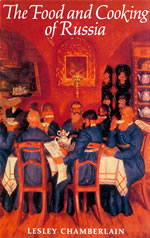 The Food and Cooking of Russia
The Food and Cooking of Russia
–
This pioneering cookbook, when it first appeared, recorded the author’s experience of the people, their culture and their history, at a time when Russia was a politically closed country behind the Iron Curtain. With practical instructions and background history on more than two hundred recipes, from blini to cabbage soup, Russian Easter Cake to ‘Russian salad’, this book revealed how everyday life continued despite political repression. Russian food was a rich subject for the thinking cook to explore. Since its first publication in 1982, when one critic said’ I read it like a novel’, this fine collection of recipes has become a classic. The new edition contains period illustrations and a new introduction by the author.
From the Reviews of the 1982 edition:
The first really good book on this fascinating subject …It is the first on its subject to take account of post-Revolutionary changes in Russian eating habits…It is also the first book I know that is written by a Russian-speaking non-Russian. Most books on Russian food are the work of nostalgia-inspired émigrés whose memories of the food…sometimes impart un unwarranted rosy colour to Grandmother’s borshch. One of the greatest virtues of Mrs Chamberlain’s book, which I read from cover to cover as one would a novel, is the great attention she pays to the culinary regions of the Soviet Union…I am prepared to believe her when she says, “Georgia has been most influential in improving the standards of Soviet Russian cooking, and has taken the place France used to occupy”.
Paul Levy, The Observer
Her disposition to examine cookery in relation to political philosophy and history…is reflected in many parts of her book; woven together with pleasing literary quotations and allusions, it turns what would have anyway been a good cookery book into something more. Those who like to keep the books of Elizabeth David and Jane Grigson by their bedsides as well as in their kitchens will appreciate its discursiveness.
Alan Davidson, The Times Literary Supplement
The Food and Cooking of Russia ISBN: 0803264615 is reprinted with a new introduction by the author by the Bison Press, University of Nebraska.
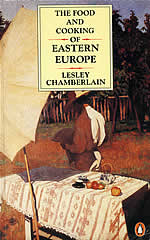 The Food and Cooking of Eastern Europe
The Food and Cooking of Eastern Europe
The Food and Cooking of Eastern Europe, when it was first published in 1989, surveyed the rich and diverse food of cultures known to few people in the West during the half a century when Europe was divided. A companion volume to The Food and Cooking of Russia, it contained more than two hundred practical recipes interwoven with historical background and notes. Readers could rediscover classics such as Hungarian gulyas and Polish barszcz in their original setting, and savour new delights such as Fugger’s Lemon Cake and wonderful vegetable recipes from the Balkans. Now, in a quite different political world, this book is a vital resource for remembering life before the Iron Curtain was lifted.
From the Reviews of the 1989 edition:
Lesley Chamberlain’s …magisterial Food and Cooking of Eastern Europe
Nigella Lawson, The Spectator
An excellent introduction to the cuisine of the lands of gulyas, dumplings and strudel.
Steven Beller, The Times Literary Supplement
The Food and Cooking of Eastern Europe is a tour-de-force of cuisines which often overlap but which have the same sturdy independence of spirit as the peoples who gave them birth.
Robert Heller, High Life
The Food and Cooking of Eastern Europe ISBN: 0803264607 is reprinted with a new introduction by the author by The Bison Press at University of Nebraska
2004
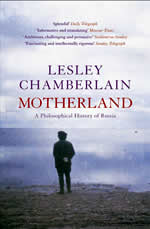 Motherland A Philosophical History of Russia
Motherland A Philosophical History of Russia
Russia is normally considered to have a highly distinct tradition in social and political thought but precious little philosophy. This book, which begins by outlining the familiar history of revolutionary ideas, challenges that view in a series of original essays. It traces a two-hundred-year preoccupation with ‘the good man in Russia’, spells out a love-hate relationship with the benefits of reason, and explains ‘the mystical turn’ which inclined Russia’s most characteristic philosophers to ground their thinking in a quasi-medieval religious outlook. A separate chapter looks at Lenin’s claims to be a ‘philosopher’ and where they led. The final section of the book attempts to show how ‘the long tradition’ survived the Soviet period partly by disappearing ‘underground’ and partly by becoming absorbed in the practice of Russian Communism, as distinct from what the letter of Marx, and of the Party, laid down.
From the Reviews:
Lesley Chamberlain, a distinguished English kruzhkovaya [Russian-style] philosopher, is concerned to redeem some philosophical value from the past two centuries of Russian history, which she describes, in a characteristic paradox, as “an intellectual disaster but not an imaginative or a moral failure”. Her book, with its impressive range of intellectual sympathy and understanding, is an intrepid non-Russian contribution to the familiar quest for a “Russian truth”, for some key, in philosophy, to “the mystery of that country and culture”…. Chamberlain tries to explore Russian philosophy neither as the passive victim of political repression, nor solely as the origin and motor of a ruinous totalitarian ideology, but as “a story of hope and belief” with its own internal impulses, achievements and pathos.’ Rachel Polonsky The Times Literary Supplement
One of Chamberlain’s main aims is to show that a conception of philosophy as an essentially moral enterprise is peculiarly Russian. More interestingly and ambitiously still, she argues that this “poetic crusade to save life from cogitation” is the key to understanding Russia itself, and to unlocking the mystery of a ”culture without reason”…Pointillist rather than teleological, her strategy is to assemble fragments of a “virtual jigsaw” in order to give a picture of the Russian moral and philosophical landscape in the nineteenth and twentieth centuries that is impressively variegated…
The pages she devotes to Lenin’s pseudo-philosophy… are among the sharpest and most keenly felt in the book She memorably describes this jejune stew of poorly digested epistemology as… a “shallow, improper book” in which Lenin was “deliberately simplifying Russia” – specifically Russia’s sense of itself as a moral quest.
Jonathan Derbyshire, Daily Telegraph
Motherland is a valiant, fascinating, and intellectually rigorous attempt to make sense of an extremely difficult subject…The implications of this analysis are, however, surprising. Lesley Chamberlain appears to believe that the collapse of the Soviet Union might have brought about the collapse of this philosophical tradition, as “individualism, selfishness, atheism, competition, prosperity” have burst into what was an hermetic society. It would be odd, however, if a system which has withstood communism cannot withstand capitalism. And in the end one wonders whether her interpretation does not tilt the balance too far against a more traditional view.
T.J. Binyon, The Sunday Telegraph
This is an ambitious, challenging and persuasive volume. Chamberlain charts how 19th-century Russian intellectuals wrestled with scepticism, individuality and the nature of goodness in a way that made the eventual triumph of Soviet dialectical materialism close to inevitable. She excavates whole generations of thinkers in a compelling manner, and is particularly good on the interplay between anarchism and religion in figures such as Berdyaev and Bakhtin.
Scotland on Sunday
‘Her forte is drawing subtle connections between widely different thinkers….yet the real vice of Motherland is a kind of intellectual over-subtlety or dandyism. Just imagine a biography of Tolstoy written by Milan Kundera. …Motherland is a clever, civilised, but ultimately somewhat inconsequential book
Edward Skidelsky, The New Statesman
With echoes of Simon Sebag Montefiore and Orlando Figes intertwined in her narrative, Chamberlain tells the story of over 200 years of Russian thinking…this intelligent assessment of the great Russian minds will provide readers with an unparalleled insight into Russia’s spirit.
Good Book Guide
The magazine Philosophy Now (www.philosophynow.org ) Issue No 54 Feb-March 2006 carries an extensive interview with Lesley Chamberlain in a special edition dedicated to Russian philosophy.
Motherland ISBN: 1843542862 was published by Atlantic Books.
COPIES ALSO AVAILABLE POST-FREE FROM THE AUTHOR.
2003
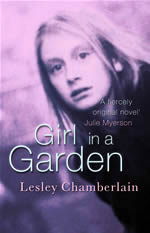 Girl in a Garden A Novel
Girl in a Garden A Novel
Linka Beecham, an imaginative and somewhat troubled ten-year-old, finds an escape from parental tensions by constructing her ideal life in fields behind the family home. Her view of the world is coloured by a fascination with words and sounds, and nature, and an eccentric friendship with a Polish refugee living in the same street. The wartime memories of the adults around her, and the events of the year in which the novel is set, 1961, tinge the events of a wild summer spent in the open air with some of the more sinister currents of recent European history.This is a coming-of-age English novel with a European dimension.
Lesley Chamberlain writes: ‘First novels tend to reflect their authors’ own lives, and it would be silly to pretend there’s nothing of mine in Girl in a Garden. But it’s worth remembering that a novel is not an autobiography and there are reasons why the material of experience cries out to be supplemented, reshaped and ultimately transformed into a new story. “Europe” seems to me the key to why this novel had to exist as one of the corner-stones of my writing. In all my work, even in the writing about food, I’m interested in where history and people’s personal lives intersect. In one respect I set out in Girl in a Garden to invent the kind of childhood I might have had, if I wanted to explain my adult interests coherently. But real life is not so coherent. The title is both random and general, like the subject of a painting. It’s not “the” girl, nor is she in “the” garden”.’
From the Reviews:
This first novel is a low-key story with hidden depths…”People thought of beauty often,” says Linka, looking back on her childhood. “They thought of people leading beautiful lives because there had been so much ugliness.” It is a measure of this deft, understated novel that the yearning for beauty, so redolent of the period [the novel is set in summer 1961], shines fitfully through, however banal or disappointing the reality.
David Robson, The Sunday Telegraph
Like the nomadic Henryk, the narrative wants to live “in an eternal present”, and only on the final pages does Linka supply an elliptical summary of her life after childhood, and her own, unspecified experience of misfortune – the lightest of touches in a novel of light touches, it is a sudden, heart-breaking conclusion to a memorable first novel. Stephen Knight, The Times Literary Supplement
Lesley Chamberlain has done a brilliant, delicate job with this vivid novel set in the post-war atmosphere of 1961. Daily Mail
The Macmillan era ideal of central heating, picture windows and beans-on-toast for tea is a fragile vessel for the savage passions of unstable, deracinated people…the truce between nature and civilisation is written in the sand. Charlotte Moore, Evening Standard
Chamberlain writes with such clarity and understanding about human pain that she effortlessly reaches the hidden child in all of us.
Lucy Beresford, The Literary Review
A convincingly dark meditation childhood. Hephizah Anderson, The Observer
Girl in a Garden ISBN:1843541033 was published by Atlantic Books
2000
 The Secret Artist A Close Reading of Sigmund Freud
The Secret Artist A Close Reading of Sigmund Freud
Freud has come under enormous criticism in the last 25 years for being ‘unscientific’. This book, which upholds Freud’s right to be considered one of the great and most formative thinkers of the twentieth century, argues that Freud’s own claims to be doing ‘science’ have misled commentators into thinking his reputation stands or falls with proof of the clinical validity of psychoanalysis. Essentially Freud had the mentality of a writer trying to communicate his experience of the world in a form the reader would find inviting. At the same time that form, the science of psychoanalysis, would protect him from claims that he was being subjective. The Secret Artist turns the obsession in Freud’s oeuvre with concealment and revelation into a way of reading his work as a quasi-literary text, concealing and revealing the author behind it.
From the Reviews:
Lesley Chamberlain’s effort to rehabilitate Freud by recognising him as a potential artist rather than a scientist is learned, perceptive, beautifully written and intellectually stimulating…Much of what Freud wrote was fiction derived from autobiography: but it is fiction which illuminates human nature as powerfully as does the fiction of Proust and Kafka. Anthony Storr, The Literary Review
Chamberlain takes Freud’s real enterprise to be autobiographical. All his books, from The Interpretation of Dreams right through to late works such as Civilisation and Its Discontents form not so much what [Frederick] Crews sees as a “multivolume fictional opus” but a poetically charged account of Freud’s own self in all its obsessiveness, ambition, insecurity, rage and, of course, genius…Chamberlain clearly recognises Freud’s covertly expressed “antagonism towards the received authority of high art and the respectability of its practitioners”…There is detectable everywhere in Freud’s writing the furious resentment – albeit strictly controlled – of the failed artist. On the few occasions when, as in the case of Leonardo, for instance, he directly considers the psyche of a maker of great art, he as good as confesses his bafflement in the face of the mystery of creativity. Really, he does not know how the trick is worked…The hunger to be an artist, allied with the inability to create real art or even to understand intimately how it is made by others, was a lash that drove Freud’s ambition, his determination to be recognised as a Great Man. John Banville, The Irish Times
“Why can’t there be more real and fulfilled love?” The strength of this book is that the author see this question hovering behind the couch. Freud said that there can’t be more satisfaction, let alone happiness, in the world because we make ourselves miserable and because we have created a society that is very good at making us even more miserable…Though hotly contested, Freudian thinking informs the ways we perceive ourselves and our society, and it remains relevant to how some of our most pressing concerns (from drug abuse and aggression to gender and sexuality) are addressed…Of course, it is entirely possible that constructing a meaningful account of how we have come to be who we are will not always seem important to a culture bent on “coaching” its way into a successful future…But if we continue to consider the past important for giving meaning and direction to our lives, it’s a good bet we will find ourselves going back to the old man to tell our tales and construct our histories. Michael S. Roth, Los Angeles Times Book Review
The starting-point of Lesley Chamberlain’s stimulating book is an oddity in Freud’s career…that he took up science…A strange, powerful figure, both authoritarian and anarchic, with an intuitive, artistic faculty moving restlessly in ways opaque even to himself – that is the Freud presented in The Secret Artist. Freud’s scientific ideal is seen here as a subtle form of self-deception, or as Lesley Chamberlain puts it, the “neurotic hiding-place” which disguised from himself his real gift for imaginative art. He was a kind of novelist working with real lives…Chamberlain’s book testifies to the fascination Freud continues to exercise once we are free of both hagiography and of idol-bashing. Ritchie Robertson, The Times Literary Supplement
The Secret Artist ISBN: 0704381478 was published in the UK by Quartet and in the US ISBN: 1583225773 by Seven Stories.
COPIES AVAILABLE FROM THE AUTHOR POST-FREE!
 In a Place Like That
In a Place Like That
This book is a series of short stories about characters from ‘East’ and ‘West’ encountering each other in the old days of the Cold War. The Western characters tend to be journalists or travellers or academics – the sort of people whose work took them behind the Iron Curtain, into a realm of existence that cast doubt on the values and certainties of the world they came from. The ‘Eastern’ characters in most of the stories live in a country called Bezzakonia, ‘a No-Rule-Place’ of moral confusion and absurdity. Both sides yearn for each other with an at times erotic intensity, because ‘over there’, ‘on the other side’, ‘with a different way of doing things’ holds out the hope of change and even the promise of happiness. In the last few stories, some of which describe different stages in the same characters’ lives, Russia owns up to its true Bezzakonian name and comes out of the cold, as the first de-Sovietized Russians make their now legitimate way West, to comic and confusing effect, because the way to happiness is not so obvious.
From the Reviews:
As a veteran of both Bezzakonia and the New Russia, I found this book immensely absorbing, as though it had been written just for me, Fellow veterans will immediately recall what it felt like to stand in a queue in order to buy a kilo of tomatoes, to be admitted to a Russian’s flat, or to emerge triumphant from a clash with some petty official. Perhaps they too seek in vain, like Alice, for the way back into that frustrating and insane, but enticing Wonderland, experiencing a sense of loss when the key can no longer be located. Lesley Chamberlain’s brilliant book is a touching and humorous requiem to a lost world.
Lindsay Hughes, Times Literary Supplement
Lesley Chamberlain’s great love for Russia has led her to acquire a Russian sensibility, and some of her episodes have the economy and sense of humour of Mikhail Zoshchenko. She is a wonderfully observant writer, constantly noticing little things. She writes of the fad for wearing T-shirts with meaningless foreign slogans on them; she remembers with nostalgia the grey horror of a refectory meal…Love or hate them, such experiences are not easily forgotten – and were well worth recalling. Chamberlain’s atmospheric fictions are a delightfully revisionist reminder of what the Cold War was really like for the footsoldiers in the front line.
Richard Gott, The Independent
In a Place Like That ISBN: 0 7043 8070 6 was published by Quartet
COPIES AVAILABLE FROM THE AUTHOR POST-FREE!
1996
Nietzsche in Turin
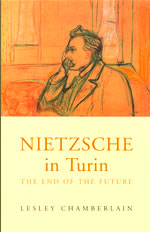
An association with the ideology of Hitler’s Germany, through the idea of the ‘Superman’, blighted the reputation of Nietzsche after the war, despite the efforts of the outstanding American scholar Walter Kaufmann to clarify the picture and despite new translations, most notably by R.J. Hollingdale, of the major texts.Nietzsche in Turin tried to remedy the situation by presenting Nietzsche as a human being. The book, which embraced the author’s fresh reading of the German texts and her travels in Nietzsche’s footsteps, traced the last ten months of Nietzsche’s sane life, from when he arrived in the north Italian city in April 1888 to the first days of January 1889, when he collapsed with a paralysis of the brain diagnosed as syphilis. Lesley Chamberlain used that extraordinary year, with its flurry of great work, as a springboard to examine Nietzsche’s whole life and career. Nietzsche in Turin provided what one critic called ‘uncanny insight’ into the mind of a great philosopher in crisis. The style of the book, in ‘prose…complex, free associative and richly allusive’, added to the impression that never before had the reader come so close also to Nietzsche the man.
From the Reviews:
Once in a while a book presents itself to one’s attention in the most unassuming way and then turns into a major intellectual event. Such was my experience of Nietzsche in Turin by Lesley Chamberlain. Chamberlain is neither a philosopher nor an academic, but she is a linguist, a thinker, and that rarest of things, a sympathetic reader. Nietzsche needed a woman’s touch, both metaphorically and in life, and here he gets it, if belatedly. This is simply the best book I have read in a very long time on the greatest philosopher of the modern age (philosopher or artist? – the question is pertinent and Chamberlain addresses it with subtlety and rigour).
John Banville, The Irish Times
This brilliant book should be a great relief for anyone condemned to read the run of contemporary Nietzsche commentaries; and for anyone who isn’t, it could be an introduction which is hard to imagine being surpassed in passion and lucidity.
Michael Tanner, The Times
Nietzsche in Turin ISBN: 0704380285 was published in the UK by Quartet and in the US ISBN: 0312181450 by Picador USA.
1995
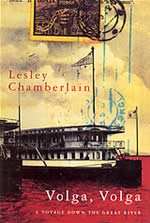 Volga Volga A Journey Down the Great River
Volga Volga A Journey Down the Great River
In the summer of 1993, just a year and a half after the collapse of the Soviet Union, the author travelled the length of the river Volga and back, from its fabricated origins in Moscow, via the canal Stalin built with forced labour, east through the heart of provincial Russia and south to the river’s mouth in the Caspian Sea. She travelled with her bodyguard-companion, the Russian writer Aleksei Slapovsky, and kept a daily log of their conversations and adventures as two river steamers in succession took them from Nizhny Novogorod to Kazan’, to Lenin’s birthplace in Simbirsk and Tolstoy’s in Samara, to the scene of the extraordinary wartime battle of Stalingrad, and thence down the serene lower reaches of a river famous for its sturgeon and the caviare farmed on the shores of the Caspian. Part travelogue, part guide to the history and sights of regions of Russia where for seventy years Western tourists had not been allowed,Volga Volga was also a record of how the great upheaval of 1991 caught provincial Russia unprepared for a more Western style of life.
From the Reviews:
Lesley Chamberlain’s engrossing account of her journey down the Volga does not simply describe her colourful personal encounter with Russia’s mythic waterway and the people who depend upon it: Volga Volga also provides a lucid historical explanation of the river and its decline, and an insightful evocation of the culture of which it is part…A bleak vision indeed, but a book well worth reading.
‘Paperbacks’ in The Times
Chamberlain’s travel writing is learned and meditative…part-lecture, part-romance, this book unearths a complex country, one whose “tragedy is uniquely eloquent”.
The Observer
Chamberlain’s prose is spare, at times jerky, but her voice is always original. Combining journalistic skills with careful research and imaginative flair, she extracts the condition of post-Communist Russia from the shell of everyday experience and detects the historical and cultural resonances of the Volga lands…Most importantly, the author never loses sight of the fact that her views of Russia are glimpsed through the veil of Western culture. I was relieved, after a spate of “Russians are just like us” books since 1991, to read one which acknowledged and explored the differences…Free too of the opposing baggage of Slavophilia, she despairs frankly of the lack of public honesty, the constant shifting of goalposts, conceptual trickery and the “historically unhinged” quality of the country. The result is a sad, enlightening book about the trauma which underlies Russians’ deep love for their homeland.
Anne McElvoy, The Times
Volga Volga ISBN: 0330333453 was published by Picador.
1990
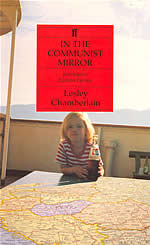 In the Communist Mirror
In the Communist Mirror
The fascination with growing up in a divided Europe, with an ‘East’ and a ‘West’ both claiming to practise the good life, inspired these journeys through the countries at the heart of the post-war Soviet Bloc. After a year in Soviet Russia which acted as a springboard, and generated huge curiosity for the peoples wedged between the German and Russian giants, the author travelled to Poland, Czechoslovakia, Hungary, Romania, Bulgaria and East Germany in search of the true identity of those occupied cultures. Her ‘baggage’ included an education steeped in German and Russian literature and a fascination with the reactions of her young daughter, who came along on several of the trips. Looking long and hard in the Communist mirror produced the hope that a middle way could be found between Eastern and Western extremes to carry the European ideal forward.
From the Reviews:
Lesley Chamberlain’s journeys seem very odd: impulsive, feckless, rather bedraggled forays into lands beyond the pale. Her interests are philosophical, literary, Freudian. Her book describes a series of love affairs with the countries she visited and with the men who symbolised them…she is a kind of East Bloc groupie, “a discontented Westerner dazzled by austerity”. Yet [she] determinedly persists in her folly, and, as a result, emerges into a kind of bemused wisdom…In the Communist Mirror is a subtle, delicate book and its modesty never quite disguises its originality.
Christopher Hope, The Independent on Sunday
Lesley Chamberlain, another woman who regularly went east in the mid-80s, has written an admirable and outstandingly honest book…the mirror has cracked from side to side since she finished her travels, yet events have increased the value of her insights into eastern European societies…Chamberlain’s travels are inner as well as geographical…she lays no claim to political nous, yet her explorations lead her far closer to the old east European independent activists’ contribution to radical politics than […] These are “not alienated”, she says; they synthesise poetry and politics. Why don’t British leftists write about eastern Europe as well as [Timothy Garton] Ash, [Lesley] Chamberlain or [David] Selbourne? Because they have been too embarrassed by the sheer fact of Soviet-type socialism to listen to east Europeans and learn from them.
Mark Thompson, City Limits
Lesley Chamberlain’s diary-style memoir – quite beautifully written – [describes] travelling in Eastern Europe in the early to mid Eighties when communism was still firmly in place. Now that the ideology has vanished the sensitive traveller and individualist – especially one like Lesley Chamberlain, with a conservative and romantic disposition – may feel a paradoxical sense of loss. For, while its monstrous form destroyed certain types of life, it protected others; guarded them from the onslaught of change and the drearier models of Western progress. Lesley Chamberlain’s discreetly erotic memoir is in its own way a work of conservation, of commemoration – imbued with the melancholy poetry which always comes from the contemplation of ruins.
Mark LeFanu, The Observer
In the Communist Mirror ISBN: 057114165X was published by Faber
COPIES AVAILABLE FROM THE AUTHOR, POST FREE!
1989
 The Food and Cooking of Eastern Europe
The Food and Cooking of Eastern Europe
‘In The Food and Cooking of Eastern Europe … I matched my personal experience of food and cooking over there to the information I could find in classic Polish, Hungarian, Romanian and other cookbooks. I consulted these invaluable sources in the round reading room of the British Museum, the London Library and on my own shelves, with more or less difficulty. As an eminent Russian of my acquaintance, who had lived in London since he was a boy but retained his native language, used to claim, he could get by across a whole swathe of the European continent by employing ‘Basic Slav’, so now did I. With a knowledge of Russian and suitable dictionaries I confronted recipes in Polish, Czech, Slovenian, Serbo-Croat (as the official language of Yugoslavia was then known) and Bulgarian. My experience of Romance languages helped with Romanian. This was a shaky linguistic principle on which to proceed. My eminent acquaintance, instead of three return tickets from Prague to Kishinev, once found himself with six singles and a watermelon. All I can say is that friends and family were repeatedly invited to taste the results of my culinary-linguistic adventures and to advise on whether the pleasure of eating had been lost or found in translation.
‘I still cook from the many lovely recipes I collected up to a quarter of a century ago. Indeed they created my culinary style. Romania taught me to make my own tarama and supplied a much-loved recipe for chicken with apricots. Cholent, a gorgeous cassoulet-like concoction of beans and goose and barley, entered my repertoire from the Jewish kitchen. Stuffed aubergines and wonderful sticky cakes were borrowings for life from the Balkans, and ‘Ajvar’ stewed peppers, left whole and with just a shot of vinegar, regularly plunge visitors to my table into ecstasy. Bulgarian rice puddings, Fugger’s lemon cake from Warsaw, Serbian bean soup, soup with yoghurt and barley…I could go on. This is real food requiring the best, freshest ingredients, and, like all excellent cooking, it is best made lovingly at home.
‘When I encounter this book again as a book, rather than a collection of recipes, I see that it was at heart a diary devoted to my sensual response to travelling in mentally difficult places. To note through their food the pleasures and frustrations of millions of people not free to come and go across the world was intended as a gesture of sympathy, but which was in no way condescending. It was perfectly clear that a morally and materially satisfying life could be led without political freedom. And yet in the end my food travels also had the opposite political function, namely to celebrate diversity. I set out to look for differences from the ideological norm, from the standards of official institutions, and also for deviations from uninformed Western expectations. I wanted at home to make better known the ordinary daily lives of ‘faraway’ Europeans who had been propelled out of the common orbit. One has to remember how little cultural interest there was in points east during the Cold War years. This was especially the case in the Anglo-Saxon world.’
From the Introduction to the 2006 edition of
The Food and Cooking of Eastern Europe.
From the Reviews:
Lesley Chamberlain’s …magisterial Food and Cooking of Eastern Europe
Nigella Lawson, The Spectator
An excellent introduction to the cuisine of the lands of gulyas, dumplings and strudel.
Steven Beller, The Times Literary Supplement
The Food and Cooking of Eastern Europe is a tour-de-force of cuisines which often overlap but which have the same sturdy independence of spirit as the peoples who gave them birth.
Robert Heller High Life.
This is the cover of the first edition of The Food and Cooking of Eastern Europe, as published by Penguin in 1989.
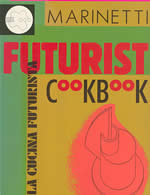 The Futurist Cookbook by F.P. Marinetti:
The Futurist Cookbook by F.P. Marinetti:
The Italian Futurist poet, dramatist and publicist Filippo Tommaso Marinetti (1876-1944) compiled La Cucina futurista in 1932, some twenty years after he burst on to the European art scene with ‘The Futurist Manifesto’. A man who cultivated a public image as a deliberate troublemaker, Marinetti and his friends espoused speed and transience as the essence of modern art and life. Their Futurism dynamised and individualised Italian painting, while their cult of ‘the-word-in-liberty’, which pursued free associative expression without syntax, gave the world its first taste in literature of a Dadaism to come. Marinetti was way ahead of his time applying Futurist ideas to food, which meant treating ingredients primarily as a means of artistic expression and only incidentally as a source of nourishment. His revolutionary recipes include suggestions for themed restaurants, food performances and ‘staged’ meals. The twenty-first century is still catching up with his ideas.
From the Reviews:
There is a faint twinge of alarm in recalling that Futurism was to become the house style of Italian Fascism. Mussolini never followed Marinetti’s plans to the letter, although one can well imagine him setting up crack squads of ravioli hitmen and a League for the Liquidation of Noodles. Mostly, however, this book gurgles to the innocent sounds of excess pleasure. Anthony Lane The Times
The Futurist Cookbook, ISBN: 0862941407, translated by Suzanne Brill, edited and with an introduction by Lesley Chamberlain, was publoished by Trefoil in the UK and Bedford in the US.
STOP PRESS: watch out for Penguin’s new printing of my edition of Marinetti’s Futurist Cookbook, due out in July 2013.
1982
The Food and Cooking of Russia
‘Many things made it an exciting project… I wanted to… recapture the sights and sounds and smells of places I had visited in a Russia which, if it wasn’t timeless, was a place people lived in and not just a token in a political game. The result was I travelled as much as I could in my free time. (I still use the wonderful iron pans I bought in Georgia.) When I was in Moscow meanwhile I tried to shop in our often poorly stocked local shops and markets rather than the opulent grocery store reserved for foreigners. Of course I often succumbed to convenience. I piled my trolley high with luxury goods behind shuttered windows and like many of my Western press colleagues felt ashamed. ‘Ordinary’ Russians, whose lives were blighted by constant consumer shortages and daily queues, knew exactly what was going on. We should have shown solidarity. My slender excuse was that I needed ingredients to try out my recipes and I just couldn’t find them anywhere else. I had the feeling I was helping to keep alive a culinary tradition which was in danger of disappearing. It was an unusual cause to adopt, not a great one in human terms, but it gave me a way of writing about, and finding readers interested in, a real Russia. Lives in which no one had time to cook and so many ingredients were unobtainable were one real outcome of the inefficient command economy. I could at least draw attention to the way Communist ideology tried to conceal this this lapse by dismissing the culinary art as a bourgeois fetish.’
From the Introduction to the new edition of
The Food and Cooking of Russia
published by The University of Nebraska Press 2006.
From the Reviews:
The first really good book on this fascinating subject …It is the first on its subject to take account of post-Revolutionary changes in Russian eating habits…It is also the first book I know that is written by a Russian-speaking non-Russian. Most books on Russian food are the work of nostalgia-inspired émigrés whose memories of the food…sometimes impart un unwarranted rosy colour to Grandmother’s borshch. One of the greatest virtues of Mrs Chamberlain’s book, which I read from cover to cover as one would a novel, is the great attention she pays to the culinary regions of the Soviet Union…I am prepared to believe her when she says, “Goergia has been most influential in improving the standards of Soviet Russian cooking, and has taken the place France used to occupy”.
Paul Levy, The Observer
Her disposition to examine cookery in relation to political philosophy and history…is reflected in many parts of her book; woven together with pleasing literary quotations and allusions, it turns what would have anyway been a good cookery book into something more. Those who like to keep the books of Elizabeth David and Jane Grigson by their bedsides as well as in their kitchens will appreciate its discursiveness.
Alan Davidson, The Times Literary Supplement
The first edition of The Food and Cooking of Russia was published by Penguin/Allen Lane.
